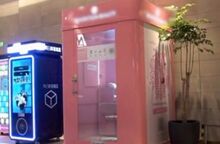“共享化妆间”现身武汉,你能接受与陌生人共享化妆品吗?
早上起床晚了,又要赶车又要化妆来不及,干脆到公司门口的共享化妆间再化妆?最近,中国的一些大城市中出现了用品齐全、价格便宜的共享化妆间,不过民众反应不一。你能接受和别人用同一只口红吗?
A new trend of "shareable make-up rooms" aimed at urban women is igniting debate in China, as companies try new ways to grab a slice of the world's largest market for beauty products.
在中国,随着商家尝试通过新方式在全球最大化妆品市场中分得一杯羹,一种以城市女性为目标的“共享化妆间”新风潮正引发热议。
The rooms represent a new frontier in China's vast sharing economy. Some think they are an affordable way to get to use expensive make-up, while others shudder at the thought of sharing a lipstick with a stranger.
在中国庞大的共享经济中,这代表着一个新前沿。一些人认为这可以让她们用得起昂贵的化妆品,而有些人则很排斥与陌生人共用口红等化妆品的想法。

frontier['frʌntɪə; frʌn'tɪə]:n.前沿;边界
Although they have been springing up in many Chinese cities since late last year, a recent opening in Wuhan has prompted a flood of discussion online.
虽然共享化妆间从去年底就已在许多中国城市兴起,但引发网民热议的是最近现身武汉的一家。
如何使用共享化妆间?
Using their phones, customers scan a Quick Response (QR) code to pay a small fee, and enter a room with a chair and dressing table.
只要用手机扫描二维码支付小额费用,顾客就可以进入配有椅子和梳妆台的化妆间。
An array of beauty products is spread out on the table, including products from high-end Western brands.
梳妆台上摆满了各种化妆品,包括多种西方高端化妆品品牌。
Users can help themselves to a range of products: moisturizers, powders, eye shadows and lipsticks. The room also provides brushes and other application tools for people to use.
顾客可以自己用这些产品化妆:保湿面霜、粉底、眼影和口红等。化妆间里还提供化妆刷和其他化妆用品。
Products in the Wuhan store are worth an estimated 4,000 yuan, according to the Chutian Metropolis Daily newspaper, so it is not surprising that CCTV watches over users as they beautify themselves.
据《楚天都市报》报道,在武汉的这个化妆间里,这些化妆品总价值约4000元,难怪里面装有监控摄像头。
It costs a small amount to use one of the rooms from anywhere between 15 and 45 minutes. In the Wuhan branch, the maximum a customer can expect to spend in one sitting is 58 yuan.
化妆间的使用时限为15至45分钟,费用很便宜。在武汉的这个化妆间,最高价格是每次58元。
人们怎么看?
Young women who have tried the rooms and who the BBC spoke to had mostly positive impressions.
尝试过共享化妆间的年轻女性接受英国广播公司采访时大都持支持态度。
"I thought the shared make-up room was great, a very creative idea and a very novel invention," said Ms Liu, a woman in her twenties from Wuhan. Though she added: "I may not go often because I don't think they're very practical."
20多岁的武汉居民刘女士说:“我认为共享化妆间很棒,极具创意,很新奇。”但她补充说:“我可能不会常用,因为我觉得不是很实用。”
Another in Shanghai said she would use them again, because she felt her skin was especially damaged and she needed to have access to high-end products.
一名上海女性则表示会再次使用,因为她认为自己的皮肤受损严重,需要使用高端产品。
Some on China's Twitter-like Sina Weibo service said that they thought the concept would make money because it allows people to try products without "being bombarded by servicewomen at make-up counters", or forced into an expensive sale for something that might not be right for them.
一些新浪微博用户认为,这个新概念会赚钱,因为可以让人们无需“忍受化妆品柜台销售人员狂轰滥炸般的促销” 就可以试用商品,也不用被迫高价买入可能不适合自己的产品。
One user in eastern Shandong province said she thought the room was "good", especially as disposable application tools were provided.
山东省的一名用户说,她认为共享化妆间“很好”,尤其是还提供了一次性化妆用具。
But others have concerns about the idea of sharing certain make-up products with strangers.
但也有不少人担心与陌生人共用某些化妆品会导致一些问题。
"Lipstick, for example, lots of people will use - that's not very hygienic," one Wuhan-based user told the Pear Video website.
一位武汉用户告诉梨视频网站说:“比如口红,很多人都会使用,不卫生。”
hygienic [haɪ'dʒiːnɪk]:adj.卫生的,保健的
"Cosmetics are personal items, I can't really accept this," another said. Others expressed concern about contracting viruses or skin conditions.
“化妆品是私人用品,我确实无法接受”,另一位用户说。还有一些人担心感染病毒或皮肤病。
Chinese shareable make-up pods could ultimately attract up to 80 customers a day, one seller told the Beijing Youth Daily newspaper. But at present just a handful of people are visiting.
某商家告诉《北京青年报》说,这种共享化妆间每天最终能吸引80名顾客,但目前顾客寥寥。
共享化妆间是全新事物吗?
Self-contained shareable make-up pods are still a relatively novel idea, and they have only begun appearing in China since October 2018. They are largely being set up by private companies, not the cosmetic brands themselves, and are now found in major Chinese cities including Beijing, Shanghai, Guangzhou and Nanjing.
这种独立且设备齐全的共享化妆间仍是相对新鲜的事物,自去年10月开始在中国涌现出来。它们大都由私企创办,而非化妆品公司,目前仅见于北京、上海、广州和南京等大城市。
Large public dressing rooms offering similar services have been around in Japan and South Korea since as early as 2014.
早在2014年,日本和韩国就曾出现过较大的公共化妆室,提供类似的服务。
The concept is part of a wave of shareable products that have hit the Chinese market in recent years. Well-known services include shareable bikes and phone chargers; but the country is also home to more obscure rentable goods, including umbrellas and basketballs.
共享化妆间是近年席卷中国市场的共享产品热潮的一部分,常见的有共享单车、共享手机充电器,以及相对罕见的一些租用物品,比如共享雨伞、共享篮球等。
China promotes shareable technologies for having both economic and environmental benefits.
中国正倡导使用既有经济效益又有环保效益的共享技术。
共享化妆间会在中国火起来吗?
It is entirely possible, given the surging spending power of urban consumers and their willingness to spend their disposable cash on cosmetic products.
鉴于中国城市居民消费能力猛增且乐意将可支配收入用于化妆品,这完全有可能。
Research from OC&C Strategy Consultants says that China has the largest skincare market in the world, worth $22bn, followed by the US.
欧析企业管理咨询公司的研究显示,中国已成为全世界最大护肤品市场,价值220亿美元(约合1493亿元人民币),美国排在第二。
And with young Chinese increasingly working longer hours outside the home, and spending more time online, the concept of a shareable make-up room may well prove desirable.
随着中国年轻人在外工作时间和上网的时间越来越长,共享化妆间概念很可能备受青睐。
But Pascal Martin, a partner at the company, says that they are still in the experimental stage, and he is not convinced they will see mass take-off.
但该公司的合伙人帕斯克-马丁说,共享化妆间还处于实验阶段,他并不确信会火起来。
He says that concerns about hygiene could pose a significant risk.
他说,对卫生的担忧是一个很大的风险。